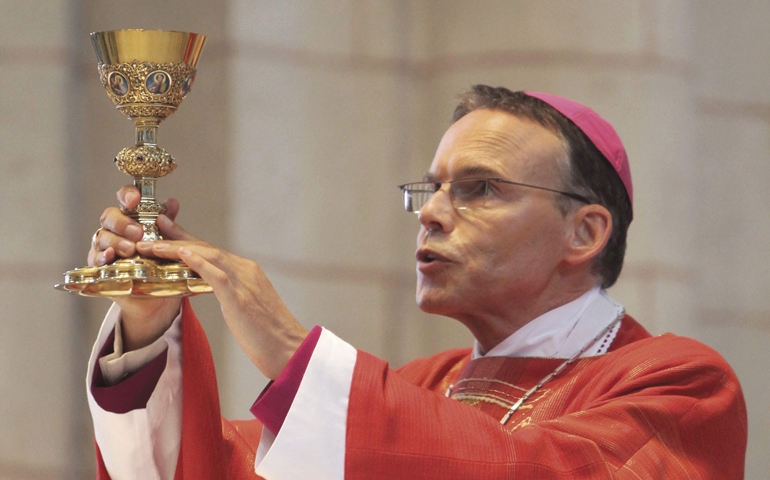
Bishop Franz-Peter Tebartz-van Elst celebrates Mass at the cathedral in Limburg, Germany, Sept. 9. (picture-alliance/dpa/Fredrik von Erichsen)
A German bishop who was criticized by his priests and laity for an extravagant lifestyle and authoritarian leadership has apologized for "misjudgments" and agreed to an outside audit of his diocese's financial records.
Bishop Franz-Peter Tebartz-van Elst of Limburg issued the apology at the end of a weeklong Vatican-ordered "brotherly visit" by Cardinal Giovanni Lajolo, a veteran Vatican diplomat and the Holy See's nuncio to Germany for eight years in 1990s.
On Sept. 16, Tebartz-van Elst released a declaration signed by himself, Lajolo and Fr. Günther Geis, the cathedral rector, that calls on the German bishops' conference to appoint a commission to audit diocesan finances with special attention on the money spent redecorating the bishop's palace in Limburg. "The final report of the commission, which will examine and include all costs, finances and procedures involved, will be disclosed publicly," the declaration says.
It is highly unusual for a bishops' conference to audit the finances of an individual bishop in this way. Canon law has no provisions for such oversight. The power of supervision over individual bishops is reserved for the pope.
Tebartz-van Elst also apologized, saying he was aware that the conflicts in recent weeks had angered and upset many of the faithful "not only in our diocese but in the whole country. I for my part am very sorry for any carelessness or misjudgment on my part."
Priests of the Limburg diocese in Western Germany had criticized Tebartz-van Elst's leadership during Masses Aug. 18 and Aug. 25, and the Frankfurt Catholic Association circulated a petition seeking the bishop's resignation. By the end of the month, they had collected 4,500 signatures.
Tebartz-van Elst flew to Rome Aug. 28 and met with Cardinal Marc Ouellet, prefect of the Congregation for Bishops. Later, Ouellet wrote to Tebartz-van Elst saying he had discussed the matter with Pope Francis, who had decided against an apostolic visitation, or formal Vatican investigation, but that Lajolo would visit the diocese as a mediator.
From Sept. 9-16 Lajolo met with Tebartz-van Elst, the diocesan council, the priests' council, the cathedral chapter, and lay and religious order representatives, according a statement on the website of the Limburg.
Lajolo told a local radio station that he wanted to talk with everyone concerned -- "naturally" also with the bishop's critics -- and he wanted to "promote a brotherly atmosphere."
Fr. Johannes zu Eltz, dean of the cathedral in Frankfurt, told the German daily Kölner Stadt-Unzeiger that he would inform Lajolo that the diocese was in a "far-reaching, destructive crisis of confidence" and, because of that, the bishop was no longer able to carry out his duties.
Tebartz-van Elst, 54, was named bishop of Limburg in 2008, becoming Germany's youngest bishop at the time. He was already known for a luxurious lifestyle and that reputation was furthered when one of his first acts as bishop was to renovate the diocesan center and his residence at a cost of nearly $20 million. At this same time, the diocese was closing other church institutions.
It didn't help Tebartz-van Elst's reputation that his predecessor, Bishop Franz Kamphaus, had years before moved out of the bishop's palace into a modest apartment in the seminary and used the official residence to house refugees.
Tebartz-van Elst's critics say he was not open about the cost of the renovations he ordered. This summer, new accusations arose that he was squandering church money and refusing in an authoritarian manner to account for it.
Among the criticisms is that he flew first class to India to visit mission projects there last year. The diocese has denied these reports, saying he had reserved business-class seats but the airline upgraded them.
His extravagant style at liturgies has not set well with local Catholics either. He favors ornate vestments with gold brocade and white gloves when presiding at Mass. During a hospital chapel dedication this year, he used so much chrism oil and incense that the altar caught fire and two-yard-high flames shot up. A catastrophe was only avoided in the last minute.
In a Sept. 1 pastoral letter, Tebartz-van Elst told Limburg Catholics that he had been hurt by "resentment and criticism" directed against him and would invite parish representatives to a "personal encounter."
"I see some of my decisions in a different light today; looking back, I would have gone about some things differently," he said. "But I need your trust even more. Where only suspicion and mistrust govern, there can be no living Christian community."
Cardinal Reinhard Marx of Munich, current president of the Commission of the Bishops' Conferences of the European Community, told the German press agency Deutsche Presse-Agentur that he does not see Tebartz-van Elst as a victim of a media campaign.
"Media campaigns come to nothing if there is nothing," Marx said, adding that rules about transparency and truthfulness apply to bishops as well as ordinary people.
Cardinal Karl Lehmann of the neighboring diocese of Mainz, who was president of the German Bishops' Conference for 20 years, sees the fact that the Vatican is now involved as a "sign for alarm" and has called on his brother bishop to seek reconciliation.
Church observers have noted that the Vatican's sending a mediator instead of a visitator may reflect a more conciliatory way of dealing with internal diocesan conflicts under Francis.
The Austrian Catholic Press Agency Kathpress commented Sept. 10: "Sending an experienced diplomat on a 'brotherly visit,' as Cardinal Ouellet has called it, in order to mediate in a conflict concerning the way a bishop is carrying out his duties is unique in the German-speaking countries and has not happened before. Quite what a 'brotherly visit' denotes remains open for the moment. It is not a visitation as Lajolo does not have the necessary plenipotentiary powers. ... Much speaks in favor of a compromise solution."
[Christa Pongratz-Lippitt is the Austrian correspondent for the London Catholic weekly The Tablet.]


